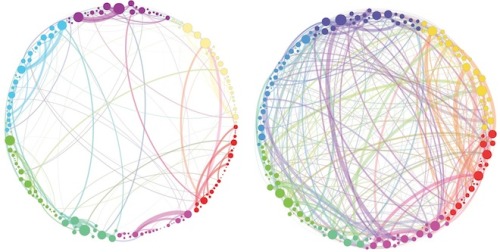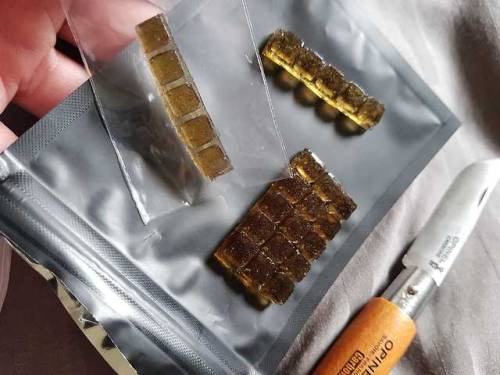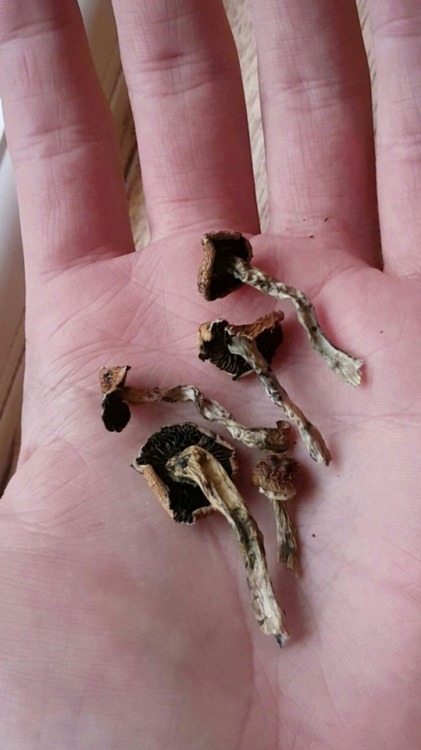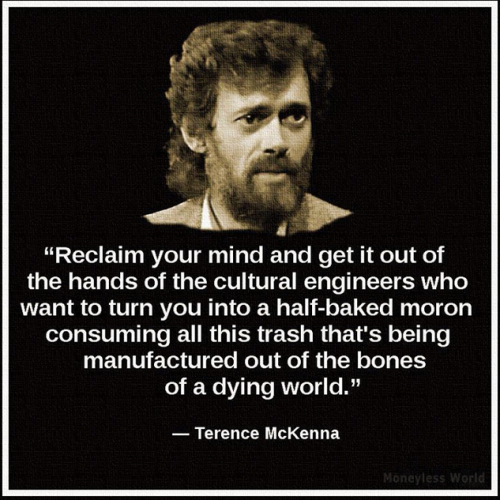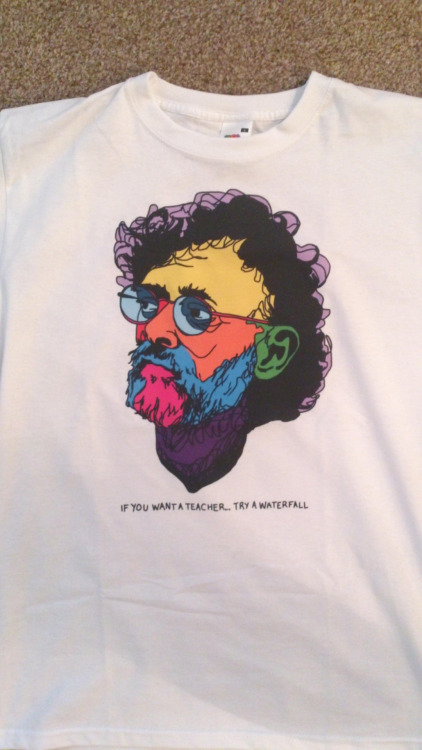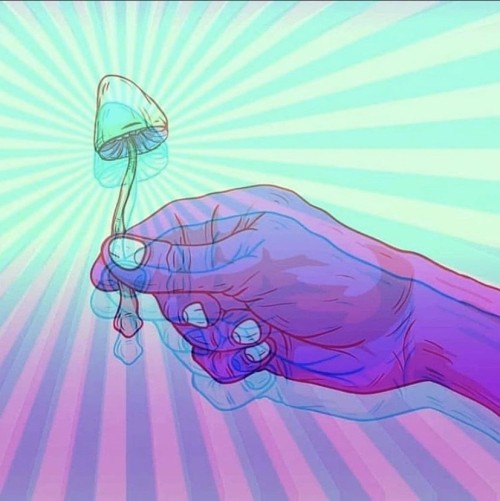#psilocybin
Wired on how magic mushrooms rearrange the brain:
In mathematical terms, said Petri, normal brains have a well-ordered correlation state. There’s not much cross-linking between networks. That changes after the psilocybin dose. Suddenly the networks are cross-linking like crazy, but not in random ways. New types of order emerge.
He told a reporter that taking LSD was one of the two or three most important things he had done in his life. He said there were things about him that people who had not tried psychedelics — even people who knew him well, including his wife — could never understand.
Post link
AlterNet, February 26, 2015.

We are currently experiencing a “renaissance” in psychedelic research, as Michael Pollan writes in a recent issue of The New Yorker. Hallucinogenic drugs like psilocybin can be used to treat a range of mental health disorders, from anxiety and addiction to depression, and researchers at the nation’s leading medical schools are intent on discovering their full therapeutic potential.
Psilocybin is among a group of drugs labeled “classic psychedelics,” which also includes LSD, mescaline and DMT, and has been designated a Schedule I drug since Richard Nixon signed the Controlled Substances Act back in 1971. This classification—which defines a drug as having a high potential for abuse, no accepted medical use, and a lack of accepted safety for use under medical supervision—has made psychedelics very difficult to study in a laboratory setting.
But the last few years have witnessed a flood of new research in the field, beginning with a landmark study by Roland Griffiths, a psychopharmacologist at the Johns Hopkins University School of Medicine. In his double-blind study, volunteers who were administered doses of psilocybin, under the close supervision of therapists, reported having life-altering experiences and long-term improvements in personal well-being, life satisfaction and “positive behavior change.” Two-thirds of participants said the session was one of the “most spiritually significant experiences of their lives.” Griffiths’ work has inspired many other experiments, including an ongoing New York Universitystudy in which advanced cancer patients undergo a psilocybin therapy session to help them manage end-of-life anxiety.
In a phone interview, I spoke with Peter Hendricks, a professor at the University of Alabama at Birmingham’s School of Public Health, about the exciting advances happening in the field. Just last month, Hendricks and his colleagues published a study in Psychopharmocology about the associations between classic psychedelic use and a reduction in psychological distress and suicidality in the U.S. adult population. Hendricks shared his thoughts about the lack of scientific rationale for our drug laws, the unique societal anxieties provoked by hallucinogens, and why a new world of psychedelic research is just beginning.
Editor’s note: This interview has been condensed and lightly edited for clarity.
Allegra Kirkland: How did you become interested in researching the effects of psychedelics on people’s mental health and overall life satisfaction?
Peter Hendricks: My background is in clinical psychology, with a focus on addiction. For people who work in the mental health field, there’s a motivation to help others. Many of us would like to see the problems we’re trying to address disappear. I realize that might sound too optimistic, but with that in mind, it’s not difficult to see why the success rates for existing treatments are so disappointing. The sort of interventions we have right now for everything from depression to addiction are not yet where we’d like them to be. So we’re looking to improve upon what already exists.
As for why psychedelics, it’s kind of an interesting story. When I was a post-doc back in 2006, I published my dissertation in a journal calledPsychopharmacology. They sent me a complementary copy of that issue so I could see my article in print, and I was so excited to check it out the day it arrived at my office. But the article I opened to was in fact [Johns Hopkins professor] Roland Griffiths’ foundational piece on psychedelic research.
AK: From Michael Pollan’s description in the New Yorker, it seemed like Griffiths’ article really marked a turning point in the scientific community’s renewed acceptance of psychedelic research. Would you agree with that?
PH:Absolutely. It was huge. I was born in 1976 so I’ve lived through the war on drugs and of course the “Just Say No” campaign of the ‘80s. Like many people, I always assumed the information I was given was accurate. I had every reason to believe and trust in the government and their rationale for the classification of drugs. Up until that moment, I thought that hallucinogens were dangerous drugs and there were valid reasons for their designation as Schedule I substances. But then I read Roland’s study, and that was really a watershed event for me. It not only changed my understanding of psychedelics, but it encouraged me to delve deeper into our drug laws and the rationale behind them. Over the course of a year or two, I came to see there is indeed tremendous curative potential in these substances and that the rationale for their legal status is very poor.
Still, as a psychologist, I would be careful myself not to belittle those who are having a hard time understanding my position. There’s a great professor in New York named Jonathan Haidt who studies the moral foundations of conservatives and liberals and gave an amazing TED talk about it. He would say that liberals typically want to see society change and go forward. Conservatives would typically like things to stay as they are. He comes to see these two forces as yin and yang; they complement one another. If everyone was a progressive, he argues, society would change too quickly and could, in the worst case scenario, descend into anarchy. On the other hand, if we never change, then we’ll never evolve—we’ll never see the sort of advancements in human rights that we’ve seen over the past few hundred years. So change is good. But I can understand how too much change too rapidly could be a frightening concept.
AK: Go on.
PH: I think in the late ‘60s, there were some pretty dramatic changes taking place. I don’t think people my age can really appreciate how monumental some of them were. Elvis’ performance where he was shaking his hips was considered extremely controversial and wild. And in just a few years, we go from that to long-haired, bearded hippies burning their draft cards and living on communes. We have music the likes of which we’ve never heard before, like the Grateful Dead with their 45-minute long jam sessions and the incredible innovations of Jimi Hendrix. I think LSD and psychedelics were fueling a lot of this change. And coming from a place of compassion, I can see how for a lot of people these changes were frightening or overwhelming. …The medical or scientific rational for classifying these drugs as Schedule I wasn’t there. But I can see how people thought that was the best thing for our country.
AK: Do you think part of the reason people are more open to this type of research now is that we’ve witnessed the failure of the war on drugs and realized people are going to use them whether or not they are criminalized? Is it just a cultural shift—that we’ve had more time to get more comfortable with the realities of drug use?
PH: I think the science and associated media coverage is playing a role. I would’ve been among those who thought that yes, hallucinogens should be Schedule I substances; yes, they’re dangerous drugs; no, there are no therapeutic applications for them. I believed this until I saw the science, until I saw that Griffiths study in 2006 and the studies that followed, including the UCLA study about easing end-of-life anxiety in advanced cancer patients. The data would show that these drugs can be very therapeutic and can occasion perhaps the most meaningful experiences in an individual’s life. Why would we not want to see how they might help us do what we do better? Why would we not want to use these substances to help relieve human suffering? I can’t think of a good reason, especially as you take a look at the data. They can be very safely administered in these controlled settings and lead to some very impressive therapeutic outcomes.
AK: Were your university colleagues on board with your ideas or did you have to push for this sort of research to be approved?
PH: I got a range of reactions, but I think for the most part my colleagues were supportive. Some people were skeptical, but I understand that because I was once skeptical myself.
AK: All of this research is quite new and the sample sizes are pretty small so far. So as exciting as it is, I’m sure people have their reservations.
PH:Absolutely. And again, I think that most of us have every reason to believe that our drug laws are based on a solid foundation of science—that there’s a logical, rationale behind them. I would have been among those who felt that there’s a reason why these drugs are illegal, even 10 years ago. But I think most of my colleagues are open to hearing the arguments, to looking at the new studies that are coming out. As scientists, we’re trained to be skeptical. I expect my colleagues to be that way. But we’re also trained to be open to new ideas, to go where the data lead us. I think that in this case the data are persuasively leading us in one direction.
The most cynical response I’ve received is: why would you pursue an area of research that doesn’t yet have federal funding? That’s a common response I get given the grant-focused nature of our positions. I understand that concern. … But I think there’s a sense among people doing this line of work that this could be such a game-changer that we owe it to ourselves, to humanity, to the field to pursue this kind of work whether that federal funding is there or not. … Obviously we would like to see that funding in the future because it’s necessary to run the sort of large-scale studies necessary to determine the efficacy of these substances. But I think for many of us this is a labor of love, and we’ll pursue this work without it.
AK: I was going to ask if you thought that the National Institute of Mental Health would ever provide funding for psychedelic research. Do you?
PH:You know, I certainly hope so and I think there’s only so long the data can be ignored. Science is a cumulative process and if time after time, a study seems to be proving the same thing, that holds weight. My friend and colleague Matt Johnson just conducted a study of psilocybin for smoking cessation and 80 percent of the participants quit smoking. That’s unheard of! There was no control condition in that study, but still, I’ve never heard of any intervention reporting 80 percent abstinence after a six-month follow-up. There are also some studies that I’ve published which are more naturalistic, using large sample sizes.
AK: Can you tell me more about the study you published in January, about psychedelic use and reduced psychological stress and suicidality?
PH:Every year, the US Department of Health and Human Services conducts the National Survey on Drug Use and Health. One of their employees will knock on your door, ask if you want to participate, and if you say yes, you would answer questions on a computer they provide you. The survey asks you about current drug use, history of drug use and a number of questions pertaining to mental health. My interest was whether or not there was a relationship between whether one had ever used a classic psychedelic and psychological distress and suicidality. With these sorts of data sets that are available to the public, you have to work with what they give you. I didn’t design the parameters of the study and there aren’t a tremendous number of questions on psychedelic use. … In any event, we wanted to see whether there was a relationship between having ever used a psychedelic and past-month psychological distress and past year suicidal thoughts or behavior.
The idea here is that psychedelic-occasioned mystical experience can be life changing or transformative. You can use these substances just one time and experience what one of my favorite psychologists William Miller calls “quantum change”: the idea that someone can change very suddenly, very dramatically—and permanently. So the question is: could using these substances just one time have put you on the path to better mental health?
AK: So this is a unique feature of psychedelics compared to other kinds of drugs? Nothing else has that kind of life-changing effect on people?
PH: To the best of my knowledge, that’s correct. It is a unique characteristic of psychedelics, classic psychedelics in particular, to provide these sorts of experiences. There are examples of these transformative mystical experiences across the world’s great religions and in fiction. …The metaphysics of it are beyond my ability to comment on, but we know that these sort of life-changing experiences happen to people and they happen organically. And here we have a class of substances that can occasion this sort of transformative experience in a good percentage of those who use them. … What we found in our study is that those who’d used them were less likely to report psychological distress in the past month, and less likely to report suicidal thoughts, planning and attempts in the past year.
AK: The New Yorker piece made the case that there is a vast difference between a doctor walking someone through a trip in a highly controlled, safe lab environment and what someone goes through during a recreational drug experience. In the latter version, there’s a lot more space for things to go wrong—for anxiety, for these sorts of life-affirming experiences not to happen. What would you say to that?
PH:That’s a very good point to bring up. Doing research with these substances is not easy. It can happen, and I’ve found the FDA and all the other government agencies I’ve worked with to be very agreeable and supportive. But there’s still a lot of red tape involved, as you’d imagine. So for those of us who are interested in exploring these substances, population survey studies allow us a means to do so, in the absence of actually being able to administer the substance to people in a lab. … Also, though I think these laboratory studies are fantastic and elegant, and Ronald Griffiths is a masterful scientist, they involve a small number of participants. Because the conditions are so tightly controlled, one could always make the criticism that these kinds of relationships will only be seen among a select few individuals in a very “artificial” environment. …So I think looking at these different kinds of studies together is key.
Again, science is cumulative and no one study is going to be perfect. But they all complement each other in one way or another. In the case of our survey study. we have a very large sample, almost 200,000 people, and we’re looking at naturalistic use in non-laboratory settings. The question is, does psychedelic use have a beneficial effect in these situations? I would argue that it does, though the benefit is certainly larger in carefully controlled settings.
AK: Do you and your colleagues have any plans to do clinical trials in the near future?
PH:We sure do! I’m really excited about it. We’re going to be investigating the efficacy of psilocybin-facilitated psychotherapy for cocaine dependence right here in Alabama. … I haven’t talked a great deal about it yet because I want to wait until we’ve started recruiting subjects before I do so.
AK: Any final thoughts you want to share on psychedelic research as an area of study?
PH: I think a key part of what we’re trying to do is change public opinion. It’s important for people to know that those of us who are working in this area are dispassionate scientists who are trying to study this in an objective manner. …We’re not interested in legalization or widespread use.
If you really think about it, there’s nothing provocative about what we’re doing. We’re clinical scientists who would like to see the interventions we have be more effective. We’d like to see an alleviation of human suffering, and the scientific data would suggest that these substances might be very effective in that regard. It’s that simple. We’re just pursuing a line of work that might make a real difference in terms of the pain that people have to endure. I would hope that everyone would agree with us in that regard, right? We’re trying to make the world a better place.
“The Great Turn” oil study by Alex Grey


“Beyond Chaos” by Sydwox

“The Misty Mountains” by Jonathan Solter

“Mycelium Mesa” by Jonathan Solter

“Blossom” by Jonathan Solter
Fuck off! Fuck you! Eat me! Suck my dick! ♀️♀️
Terence Mckenna tshirts & more available here!
http://machineelves.spreadshirt.com (U.S. / International)
http://machineelves.spreadshirt.co.uk (U.K. / European)
Also available in Black & Tie-Dye!
Post link

02/02/2020

I did shrooms again last night and I can’t help but be blown away with the impact they have on the mind
My last trip before was on New Years, for much of January I was very happy, creative and finding myself to be mindful
Over the past week or so I have felt my mind to become convoluted again
This is a common principle though. Fifth hermetic principle being rhythm. The rhythm of my mental state sways between blinding spiritual openess acceptance and a dark confused state of wonder.
I have never found a good way to draw myself back towards my lighter state till I began taking psilocybin frequently.
It is truly amazing how the mushrooms open your mind to communicate with itself and I can’t help but feel love for this phenomena.

This life is chaotic and can be unnerving. I say this a lot but none of us signed up to be here. With the current state of the world mental health issues are on the rise especially among younger people
I myself have been in mental states where I convinced myself death was the easiest escape. I’ve almost done it too.
I just want you to know if you feel this way please talk. If you don’t feel comfortable talking to someone around you fucking talk to me. I will literally listen and take time out of my life to talk to you and I will do it happily
Together we can broaden the perspective. Life is beautiful, painful but beautiful. The fact that you’re here is outstanding
I mean fuck just think about the complexity of a human being.
YOU ARE NOT OBLIGATED TO FOLLOW THE PATH SOCIETY SETS FOR YOU
YOU HAVE YOUR OWN PERSONAL TRUTH AND YOUR ONLY OBLIGATION IN THIS WORLD IS TO MANIFEST THAT TRUTH
Psychedelics are illegal not because a loving government is concerned that you may jump out of a third story window. Psychedelics are illegal because they dissolve opinion structures and culturally laid down models of behavior and information processing. They open you up to the possibility that everything you know is wrong. - Terence McKenna
Post link
I’ve come to the point where I view myself (I, us, we) as a traveler
A dynamic function of the universe made of dead star material
A traveler that is one within and without the infinite flow of the universe
I am not 20 and you are not your ‘age’ the one you identify as at least
Weare 13.8 billion years old
The infinite flow of space and time and everything beyond that exists
within a paradox. A dualistic/non-dualistic paradox
But remember to hear and to understand are two very different things. Take up meditation and if you find the courage dabble with psychedelics
See where it takes you.
STARBOY 1⇂

One of my biggest teachers just passed on
Rest In Peace Ram Dass

subliminal

Life’s beautiful. After my recent shroom trip I have not felt happier in such a long time
Existence can be so confusing and so tragic
None of us signed up to be here
Society will do its best to strip you of your natural existence
But it’s still there, that primal draw. That spiritual energy we all have in the back of our mind
Don’t let the negative energy that encapsulates our modern world drag you down
We came into existence at a beautiful time where we can share so much with all kinds of people around the world
A growing global consciousness
What I found best to tap into energy is to put down the technology that consumes me. Take shrooms or smoke after a small break, get into nature and then let your mind run free
Take up small meditation practices
In time it’ll all be there cause it’s already in you

Life’s wack
saw you kissing dirty mirrors

Drew some fun guys.

